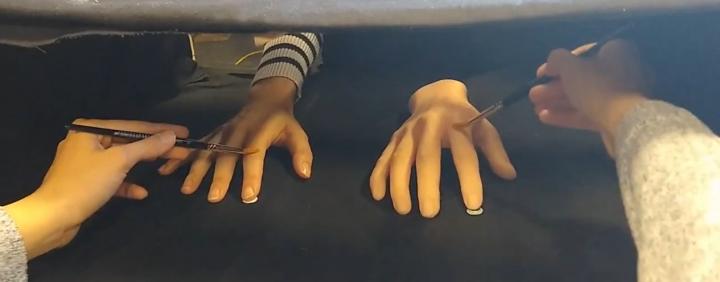used to help explain the brain's understanding of the body, as well as scores of clinical disorders, has been dismissed as not fit-for-purpose in a new academic paper from the University of Sussex.
The Rubber Hand Illusion, where synchronous brush strokes on a participant's concealed hand and a visible fake hand supposedly give the impression of illusory sensations of touch and of ownership of the fake hand, has been considered accepted science for more than 20 years. Psychologists believe it increases knowledge of the brain's understanding of the body, as well as scores of clinical disorders.

The Rubber Hand Illusion. Credit: University of Sussex
Yet a more recent analysis says those claims don't add up. Instead, the paper is not "fit for purpose", which undermines all those psychologists who have claimed to both replicate it and affirm it.
Control conditions typically used in the Rubber Hand Illusion are not valid and make it more likely that the commonly reported effects of the Rubber Hand Illusion can be attributed to imaginative suggestion, which is as scientifically legitimate as 'hypnosis.'
Last year, Dr. Peter Lush, Research Fellow at the Sackler Centre for Consciousness Science at the University of Sussex, and colleagues reported in a PsyArxiv paper there are substantial correlations between response to the Rubber Hand Illusion and response to imaginative suggestion , or phenomenological control, in a large sample of 353 participants. This study shows that response to the Rubber Hand Illusion is, partially or entirely a suggestion effect.
Psychologists have long been aware of the dangers of 'demand characteristics' - in which subjects, often without realizing it, say what they implicitly think they ought to say. If a cornerstone belief like the Rubber Hand Illusion is undermined by suggestion, potentially many other experiments are too.
"The extent to which phenomenological control confounds psychological science is currently unknown, but may be substantial," says Lush. "If the effects are widespread - and they may well be - psychology will be faced with a new crisis of generalizability."
In the new study, participants were provided with information about the Rubber Hand Illusion procedure (including a text description and a minute-long video demonstration of the illusion) and then asked to fill out a standard questionnaire on what they would expect to happen if they were a participant in the procedure.
People expected the same pattern of results that is typically found in Rubber Hand Illusion studies, both for the 'experimental' conditions and the 'control' conditions.
According to Lush, this means the control methods that have been used for 22 years of Rubber Hand Illusion studies, are not fit for purpose because demand characteristics have not been adequately controlled, meaning the illusion may be, partially or entirely, a suggestion effect.




Comments